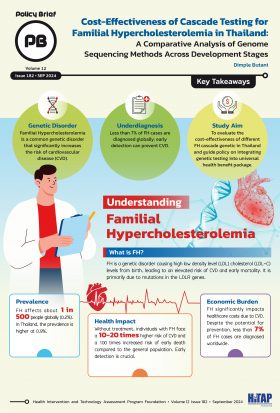This website uses cookies so that we can provide you with the best user experience possible. Cookie information is stored in your browser and performs functions such as recognising you when you return to our website and helping our team to understand which sections of the website you find most interesting and useful.
Policy Brief Issue 182: Cost-Effectiveness of Cascade Testing for Familial Hypercholesterolemia in Thailand: A Comparative Analysis of Genome Sequencing Methods Across Development Stages

Details
Familial Hypercholesterolemia (FH) is a genetic disorder characterized by elevated cholesterol levels, significantly increasing the risk of heart disease. Early detection through genetic screening can play a crucial role in preventing serious health outcomes.
This study marks the first global economic evaluation of FH cascade testing, utilizing both conventional and early-stage Health Technology Assessments (HTA). It examines the cost-effectiveness of two genetic tests—Whole Exome Sequencing (WES) and Long-Read Sequencing (LRS)—at different stages of market development. One is at the market access stage, while the other is in early development. By applying both conventional and early HTA approaches, the research investigates how these testing methods can improve patient outcomes and reduce healthcare costs. The findings have the potential to inform coverage decisions for the inclusion of FH genetic testing in Thailand’s Universal Coverage Benefit package.




